Arenas for Governing : PH'6Q
The focus in this section is on the Architecture, psychosocial pressures, and determining names, not on specific frameworks enabling practical use of particular Arenas. So there will be minimal specifications or explanations of properties and applications.
Orientation
The is dominated by the pressure for Autonomyand meets the Primal Need for governing.
As explained, are mobilized by and they lead to the expectation of benefits. It follows that these Arenas have profound political .
We all seek benefits from society, so all Arenas may be subject to intense concern by everyone from time to time, which is in contrast with other Domains.![]() More
More
The Arenas
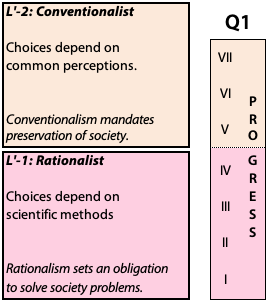
generates a hoped-for political benefit that is based in solving problems () subject to preservation of the society's traditions ().
That means it is about meeting desired social goals in a ways that are enabled and shaped by custom. Everything depends here on delivering helpful improvements, so the primary psychosocial pressure appears to be for performance.
Proposed THEE Name:
generates a hoped-for political benefit that is based in preservation of society () subject to interests of the most powerful groups ().
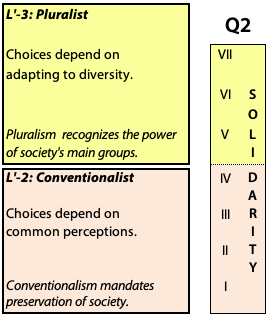
That means it is about respecting social values and responding to stressful events, even if compromises broadly favour the existing power structure. The challenge here is that society will be disrupted is it does not stand firm and united, so the primary psychosocial pressure appears to be certainty in regard to the relevant values.
Proposed THEE Name:
generates a hoped-for political benefit that is based in respecting the interests of powerful groups () subject to the call for self-reliance and initiative of each member of society ().
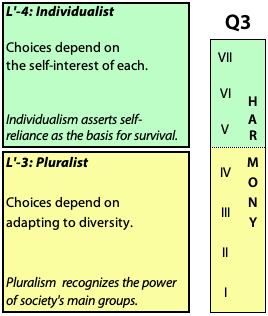
An individual is only recognized in society through the group(s) to which he belongs. That means it is about the inevitability for a diversity of groups as the foundation for personal thriving in society, with individual self-interest used to empower a preferred group. A war of all against all must be avoided. So the power structure is a given, with individuals having some choice of groups to join and how to operate. The primary psychosocial pressure appears to be for acceptability in relation to groups and the group structure.
Proposed THEE Name:
generates a hoped-for political benefit that is based in self-reliance and the pursuit of self-interest () subject to the necessity of social interaction and the needs flowing from living within a community ().
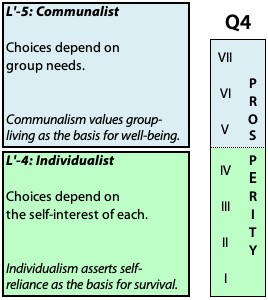
That means it is about personally benefiting from interacting with others. As self-interest is a necessity for surviving and community participation is vital to thriving, the primary psychosocial pressure appears to be for well-being.
Proposed THEE Name:
generates a hoped-for political benefit that is based in the necessity of social interaction and community living () subject to the necessity of rules accepted by all to provide protection and predictability ().
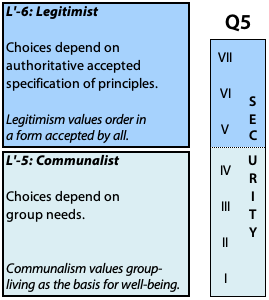
That means the setting of widely followed rules that ensure the goods emerging from social life are not stolen, exploited or cornered by those willing to exercise brute force. As breaking rules is easy and personally beneficial, the primary psychosocial pressure appears to be for understanding of their necessity.
Proposed THEE Name:
generates a hoped-for political benefit that is based in the acceptance of rules to provide fairness and protection () subject to recognition of the role of inspiration and inner conviction in deciding what is right and good ().
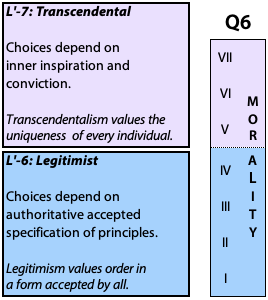
That means it is about ensuring that regulations respect the uniqueness and inalienable rights of every member of society. Given the rule-following is ultimately optional and convictions about what is good are a private matter, the primary psychosocial pressure appears to be for autonomy.
Proposed THEE Name:
generates a hoped-for political benefit that is based in every person having an inner sense about what is right and good () subject to recognition that unavoidable personal and group differences can and should be solved by reason and effort ().
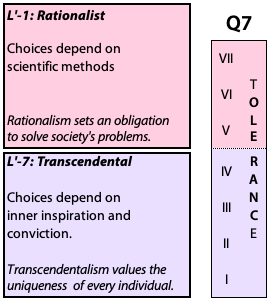
That means it is about ensuring that personal ability can be freely used for self-evidently required social development. Putting social needs ahead of self-interest suggests that the primary psychosocial pressure is selflessness
Proposed THEE Name:
Secondary Psychosocial Pressures
In the , the are mobilized by hope that provides for significantbenefits. As we ascend the , the become progressively more abstract.
This Arena has performance as its primary pressure as explained above.
Reviewing the constituent perspectives——there appears to be a secondary pressure for understanding without which none of the processes will be well-handled.
Other pressures may be involved but they are not so crucial. ![]() Details
Details
This Arena has certainty as its primary pressure as explained above. However, there is an expectation here for achieving consensus in relation to some sort of challenge.
Reviewing the constituent perspectives——there appears to be a secondary pressure for performance. Where cohesion is unsatisfactory, solidarity suffers.
Other pressures may be involved but they are not so crucial. ![]() Details
Details
This Arena has acceptability as its primary pressure as explained above. However, daily life depends on a stable social structure and each person is dependent on their group for meaningful social recognition and support.
Reviewing the constituent perspectives——there appears to be a secondary pressure for selflessness without which none of the processes will be well-handled.
Other pressures may be involved but they are not so crucial. ![]() Details
Details
This Arena has well-being as its primary pressure as explained above.
Reviewing the constituent perspectives——there appears to be a secondary pressure for autonomy. Prospering requires a freedom and a responsibility to find well-being and to be productive in a personally preferred way.
Other pressures may be involved but they are not so crucial. ![]() Details
Details
This Arena has understanding as its primary pressure as explained above.
Reviewing the constituent perspectives——there appears to be a secondary pressure for certainty. Ensuring security involves realizing the world is filled with potential dangers but that it is worth reducing the uncertainty surrounding these.
Other pressures may be involved but they are not so crucial. ![]() Details
Details
This Arena has autonomy as its primary pressure as explained above.
Reviewing the constituent perspectives——there appears to be a secondary pressure for well-being. While morality demands a willing altruistic concern for the needs of others and the community, each person is expected to be able to feel good when maintaining community standards.
Other pressures may be involved but they are not so crucial. ![]() Details
Details
This Arena has selflessness as its primary pressure as explained above.
Reviewing the constituent perspectives——there appears to be a secondary pressure for acceptability. in any society assumes that pursuit of communal betterment involves selflessness that i subject to accepting. This permits a wide variety of beliefs and interests that are found in any community, subject to certain limits which may be articulated.
Other pressures may be involved but they are not so crucial. ![]() Details
Details
It is now evident that there is a particular pattern of secondary pressures.
- Now review the psychosocial pressures in the Q-expansion.
Originally posted: 24-Sep-2022. Last updated: 12-Mar-2023.Performan
